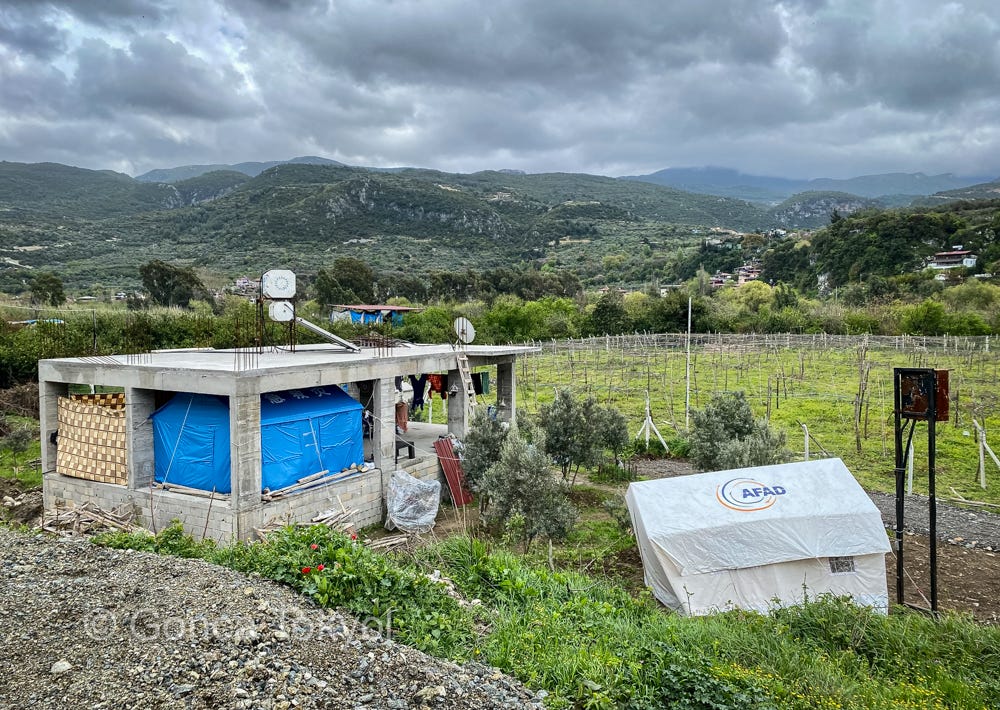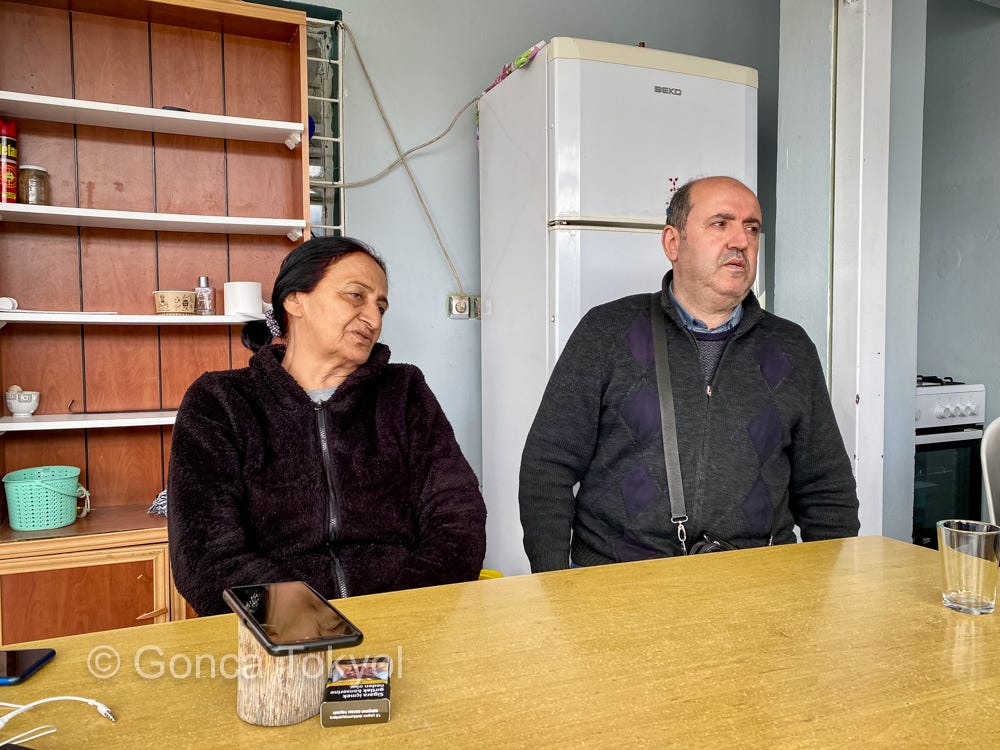The road leaving Antakya was packed with earth-moving trucks and everything around us was covered in a layer of dirt. Through the rear window, the city’s collapsed, sandstone buildings looked more yellow than usual as dust clouds hung over rubble removal sites.
But the air began to clear as we drove up Mount Musa – once a key resistance point for Armenians in 1915.
"It feels like we’re in a different world now," said Evren Günaydın, a born and raised Hatay resident, who was driving the car.
The landscape was a lush green and birds were chirping in the spring sun.
"Everything looks the same as before. It's like we’re coming for a picnic on a regular Sunday and when we go home, we’ll find Antakya as it was," Günaydın said.
Of course, we would not, but we could daydream. After devastating earthquakes hit Turkey and Syria on Feb. 6, more than 50,000 people died and millions of residents were displaced or forced to leave their cities.
Hatay, one of the worst-affected provinces, had a pre-quake population of 1.6 million. Since February, 600,000 Hatay residents have relocated to other provinces, according to figures from Turkey’s disaster management agency, AFAD.
Many of the remaining one million Hatay residents, meanwhile, have relocated to villages within the province.
Those taking part in this exodus say life is easier, or at least more manageable, in rural areas. However, the lack of regular aid distribution to villages, and the new strains placed on limited or damaged infrastructure are raising concerns about the long-term sustainability of Hatay’s rural population surge.

In villages near Antakya, people are still dependent on humanitarian aid. Many don’t have proper clothes for summer since the first round of donations was aimed at keeping people warm through cold winter weather.
When Turkey recap visited Aknehir, a village 30 minutes from Antakya, children wearing winter boots were playing “ortada sıçan” or “piggy in the middle”.
Nearby, Nahla Ekşi was chatting with a neighbor in front of her house. After her non-stop insistence, we accepted to drink coffee with her, but she refused our offers to help her with preparations inside.
"The house is too dangerous," she said. "It can collapse anytime. I don't want you to get hurt if something like this happens." Following the earthquakes, there were visible slits separating her home from the village's road.
Nahla Ekşi and her husband Ali Ekşi, both in their 70s, currently sleep in a tent they set up in the backyard of their home. They’ve lived in this village their entire lives.
Aknehir's population was about 2,200 in the early 2000s, and according to village muhtar İsa Taş the number of residents had been decreasing until this year.
"People were leaving here to live in the city center, but our population of 1,480 has almost doubled after the earthquakes," Taş said. "Those who lost their homes moved here next to their relatives. Many didn't feel safe even if they didn't lose their homes, so they came here."
Among the new arrivals is Elçin Açıkalın. She had been living in Defne, another Hatay district, after losing her husband two years ago. Following the earthquakes, she and her son moved to her family's old home in Aknehir.
Soon after, 30 of her relatives joined her at the village house and have since set up several tents in the backyard, where they currently live.
"I was just about to feel normal again," Açıkalın said, talking about life after she lost her husband. "But then the earthquake hit, and I lost everything again.”
“We came here, and it's better than nothing, but officials act like we don't even exist. I haven't seen any official aid here since day one. Everything we have comes from independent volunteers and other municipalities like İBB," she said, referring to the İstanbul Municipality.
Açıkalın and many others interviewed by Turkey recap mentioned a lack of official aid to Aknehir and other villages in Hatay. AFAD did not respond to Turkey recap's numerous requests for comments or information.
Elif Azazi, another new resident of Aknehir, claimed that in addition to insufficient aid distribution, government officials have also blocked aid distribution provided by individual groups.
"We stayed in our greenhouse for days. It was raining, and the weather was freezing," Azazi, a retired teacher, said. "Some of my former students learned about the situation and arranged some tents for us. But they couldn't manage to get them delivered because officials didn't allow it and confiscated [the tents]."
Azazi said recent events showed to her the little value given to human life not only in Hatay but also throughout the country.
"Months after the earthquake, we still have problems accessing clean water," Azazi told Turkey recap. "We don't know if tap water is safe to use, and we depend on bottled water for almost everything. But there is no distribution system.”
She continued, “People beg for water in 2023 in this country. Everyone should know that."
Hatay's water infrastructure was heavily damaged by the earthquakes. The Konya Metropolitan Municipality fixed most of the water system, but problems remain. In addition, due to contamination concerns following the quakes, people are afraid to use tap water for food or while washing their faces or brushing their teeth.
According to the head of the Antakya Chamber of Agriculture, Mehmet Muzaffer Okay, the city’s water problem is not limited to people's daily life. In a region where irrigated farming is common, Okay told Turkey recap despite intensive repairs by the State Hydraulic Works (DSİ), much of the city’s irrigation systems remain damaged.
"As the chamber, we prohibited double-planting in the city to save at least some of our water resources," Okay said. "But solving the irrigation problem won't be enough. Harvest time is at our door, and a lot of farmers lost their equipment. Most of the cold storage depots, which were crucial for exports, are still damaged.
Providing animal feed and fertilizers were also common problems for farmers still operating in the region, though many have gone elsewhere.
"We lost the workforce,” Okay continued. “The city is seriously devastated. It's not something that will improve from today to tomorrow. It will take at least five years for us to somehow recover.”
“But will people return after five years? I'm afraid the recovery will come too late for us. There is no difference between the survivors and the dead around here. In every place, the people have been abandoned."
Turkey recap is an independent news platform supported by readers via Patreon and Substack. Supporters get access to our Slack channel, timelines, calendar and more.
We also invite you to visit our merch store, but if you simply liked what you read, subscribe here or share it with a friend. Queries and pitches: info@turkeyrecap.com.
Diego Cupolo, co-founder + editor @diegocupolo
Gonca Tokyol, freelance journalist @goncatokyol
Ingrid Woudwijk, freelance journalist @deingrid
Verda Uyar, freelance journalist @verdauyar
Gökalp Badak, editorial intern @gklpbdk






